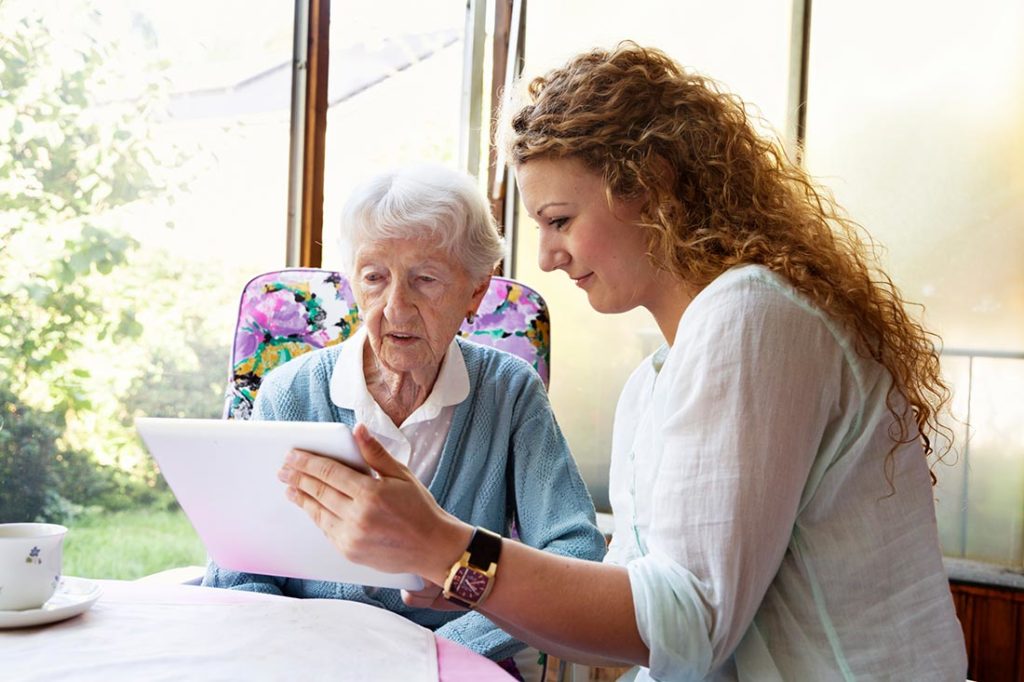Ageing and Technology: preventing Dementia and Alzheimer’s
How caregivers can introduce technology to prevent or slow down the appearance of Dementia and Alzheimer’s in their elderly loved ones.
Written by Stannah

As the world’s population is getting older, Ageing and Technology are pressing themes, and since technological devices are advancing faster than many of us could have ever imagined. Self-driving cars and virtual reality headsets have adapted from science-fiction to reality right in front of our eyes. These rapid changes may intimidate some seniors, as new technology can sometimes feel too difficult and confusing to comprehend.
This fear, unfortunately, prevents many seniors from experiencing the benefits of the technological revolution. As a family caregiver, it is important to encourage your elderly loved ones to embrace these new technologies, particularly seniors that are living with Alzheimer’s and Dementia.
Tablets for memory stimulation
Recent studies have shown that tablet computers can be a practical tool for cultivating memory stimulation and improving cognitive function in memory-care patients.
YourLink has compiled a list of 5 reasons tablets and iPads are becoming useful devices for enhancing the lives of seniors.
- They are lightweight and share many similarities with books, allowing them to be easily carried anywhere. Unlike laptop computers, which may be cumbersome, or older model tablets, new generation tablets can go anywhere.
- Tablets are far easier to use than traditional computers, particularly Apple devices which have been touted for years as technology for those with no experience of technology.
- It’s easy to build knowledge with a tablet, in bitesize pieces. Once a senior has navigation basics down pat, then they can learn how to use an app, or access a video, or take a photo.
- Tablets are about to be highly personalised. This means adding only useful apps, and hiding ones that aren’t necessary, rearranging the display so that it is easier to find what they want, or increasing the font size.
- Updates to the device are simple, and automatic. Whereas computers required interaction to do updates, tablets simply run updates in the background, meaning seniors don’t have to lift a finger.
Not only are these points valid, but there are other reasons that tablets can benefit seniors, too:
- Seniors unable to express themselves are provided with a new means of communication that elicits exciting interaction.
- Each device can house a massive library of music and photos that can ultimately serve as positive memory triggers.
- iPads and tablets bridge the gap between the older and younger generations. With the availability of programs such as Skype, seniors are afforded the emotional and physical benefits of frequent contact with children and grandchildren.
- Downloaded photos and emails from family members quickly become prized possessions.
- A seemingly endless list of applications, that includes games, puzzles and social media platforms, encourages socialization with family members or other residents of an assisted living facility.
- Some applications even use animated figures performing daily activities to encourage mobility. Even though some seniors may be unable to physically complete each action, you will often find that they can mimic the behaviours.
- By monitoring your elderly loved one’s daily habits and movements, iPads and tablets can provide reminders (e.g. taking pills) or automatic processes (e.g. turning the thermostat down while they are sleeping).
- Elderly loved ones are encouraged to showcase their creativity by creating simple graphics and pictures.
Stay connected to the world outside your home
Technology offers more than just cognitive stimulation. It encourages seniors to be mentally active and physically engaged while providing an opportunity to remain connected to the world outside of their home or assisted living facility.
The benefits of new technologies are not limited to solely patients with Alzheimer’s and Dementia, and should be embraced by all seniors. While Tablets and iPads lead the list of new useful technologies, other highlights include health tracking software and wireless home monitoring, all of which can ultimately improve the lives of your elderly loved ones.
Telstra’s Tech Savvy Senior program is a good start for available resources for those requiring assistance in educating elderly loved ones on new technology. Many communities and companies also offer local workshops and classes, and organizations such as the aforementioned YourLink and Silversurf were developed to aid the transition of seniors into the technological era.
It has become increasingly important to keep your elderly loved ones engaged in the evolving landscape of technology. With patience and perseverance from family caregivers, even timid seniors can experience the immense benefits of the technological revolution.
While much of this discussion has focused on improving the cognitive functions of your elderly loved ones, it is important to not lose sight of the enhancements to physical ability that can be provided by new technology.
How does dementia affect mobility?
Alzheimer’s and Dementia may also impact a senior’s mobility. Dementia is caused by the deterioration of the brain cells which not only affect mental abilities, but also physical coordination. Some of the effects of dementia in mobility are:
- Slowness of movement;
- Stiffness in the body;
- Loss of coordination and balance.
For seniors experiencing reduced mobility, Stannah offers some of the most technologically advanced and highly-regarded chair lifts on the market. With a Stannah Stairlifts you can be sure that your elderly loved ones are able to safely and independently navigate their homes.
For more information about stairlifts, please click here “Our Stairlifts”.
